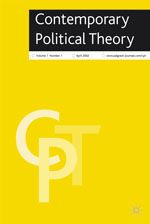 October 15, 2014: My article Debating Violence on a Desert Island: Engels, Dühring and Robinson Crusoe [behind paywall] is now officially out in Contemporary Political Theory. Here is the abstract:
October 15, 2014: My article Debating Violence on a Desert Island: Engels, Dühring and Robinson Crusoe [behind paywall] is now officially out in Contemporary Political Theory. Here is the abstract:
Ever since the publication in 1719 of Daniel Defoe’s Robinson Crusoe, the novel’s eponymous protagonist has had a pervasive presence in the modern social and cultural imaginary, giving rise to an entire literary genre known as Robinsonades. In Anti-Dühring (1877), Friedrich Engels identifies such a Robinsonade in the work of Eugen von Dühring, the target of his polemic, and draws on it for a critique of ahistorical theories of violence. The particular version of the Robinsonade Engels ascribes to Dühring is fabricated, yet a close examination of this fabrication suggests that it serves important analytic and interpretive purposes. Ironically, Engels’s critique of Robinsonades is so compelling that it ends up undermining his own tendency to economic and technological reductionism. Despite Engels’s attempts to distance himself from the Robinsonade he projects onto Dühring, the Crusoe story acts as a fraught supplement to his own theory of violence. In particular, it reveals the tensions in his work between, on the one hand, economic and technological reductionism, and on the other hand, attention to social, cultural and symbolic forces without which no plausible history of violence can be written.
Sorry, the comment form is closed at this time.